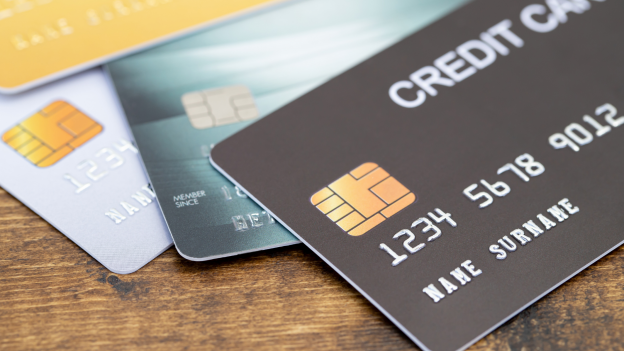Credit cards can offer peace of mind, but more often than not, they create undue stress. We talked to credit experts and mental health professionals, who say you can bring tranquility into your financial life by following these five strategies to mindfully manage your credit card.
1. Clear away credit card clutter
Have you ever stood at a cash register, shuffling frantically through a stack of plastic to find a specific retailer’s card? Trying to keep track of and manage too many cards can be overwhelming. So, if you have more than a few cards, experts recommend that you pare down your collection.
“You need to lighten your load,” says Catherine Williams, Vice President of Financial Literacy for Money Management International, a credit counseling firm with offices in 22 states. She recommends keeping two multi-use cards.
One should be a rewards card to use instead of cash — to buy items such as groceries, gas and monthly yoga classes — that will make it easy to track spending and prevent worrying about cash getting lost or stolen. Never carry a balance on a rewards card, because they have high interest rates.
The second card, Williams says, should be a very low-interest credit card for unexpected big-ticket purchases — such as a new household appliance or car repair — that you might have to pay off over a few months.
If you have too many retail credit cards from clothing, electronics and home improvement stores, Williams recommends paying down your balances and closing one or two cards every three to four months. “It’s a slow and steady way of changing a habit,” Williams says.
2. Use plastic for self knowledge
The maxim “know yourself” applies to finances as well as other areas of life — and a credit card can serve as a valuable tool for gaining self-knowledge and clarity, experts say.
“I love the idea of using a credit card to understand your budget — you can get a lot of peace of mind from it,” says Kit Yarrow, a consumer psychologist at Golden Gate University in San Francisco, who recommends learning about yourself by putting all your purchases on one credit card for a month. “You can come up with real data and new insights about how you’re managing your money,” Yarrow says.
Hard numbers can be useful, Yarrow says, because consumers tend to underestimate the amount they spend on routine purchases — which can blur together in the mind.
“A lot of people have no idea how it adds up when they spend on gas, tolls, coffee, cookies or that organic arugula they decided to throw in the cart at the grocery store,” Yarrow says.
And, consumers sometimes fool themselves on luxury purchases — such as new designer shoes — to convince themselves it’s OK to splurge. Yarrow says: “They might tell themselves, ‘Oh, I haven’t bought any shoes lately,’ when, in fact, they bought three pairs this month.”
3. Clarify your financial priorities
One key to financial peace of mind, experts say, is figuring out how to use credit cards in harmony with your values and priorities. “We often get caught up in routine and fill our lives with the small things and then there’s no room left over for the big things,” says Elisha Goldstein, a psychologist and co-author of “A Mindfulness-Based Stress Reduction Workbook.”
He recommends taking time alone to reflect on your priorities, then thinking about how they relate to your finances.
Once you’re clear on priorities, you can sit down at the beginning of each month and decide how you will spend and use your credit cards in a way that reflects what’s important to you.
When you’re trying to cut down on credit card spending, it’s also important to take small steps. For example, you can decide not to put anything on your card for 30 days to cut down on spending. Making small, specific commitments to yourself provides peace of mind and better control over your behavior.
4. Practice mindfulness with money
If you’re trying to change your credit card habits — especially if you’re caught up in a cycle of spending now and regretting it later — mindfulness can help, experts say, by helping to make you aware of habits that longer work for you.
“You might normally walk by a window and see a sweater and, before you know it, you’re walking out of the store with the sweater and have thrown it on the credit card,” Goldstein says. So, if you wanted to practice mindfulness rather than just reacting impulsively, you would take deep breaths, pause and become aware of your body, your emotions and your thoughts, Goldstein says.
“The foundation of mindfulness is being intentional, paying attention to what’s happening in the moment,” Goldstein says. “And when we pay attention to cravings, we realize these are just thoughts and not things we need to necessarily act on.”
5. Accept your financial reality
A downside to credit cards, experts say, is that they allow you to pretend you have more money than you actually do — so it’s important to practice acceptance of your actual financial reality.
One of the biggest stresses you can create in your life is not understanding or admitting what you can actually afford. Not knowing your financial reality causes stress in your wallet and emotionally.
Knowing — and accepting — what you can actually afford isn’t just a matter of hard numbers. It involves your priorities, your wishes and your emotions, too.
For example, maybe some friends want to go to a pricey restaurant — and technically you could afford it, but you know you’d be eating ramen for the rest of the week. If you go, you won’t enjoy it as much as if you could afford it or budgeted for it. That sense of regret will create an emotional price when the check comes as well as a monetary one. By being honest with yourself and your friends about what you can afford, you will have greater peace of mind.
If you practice these healthy habits, you can expect to feel calmer, more in control and more balanced about your credit cards — and the rest of your financial life.
